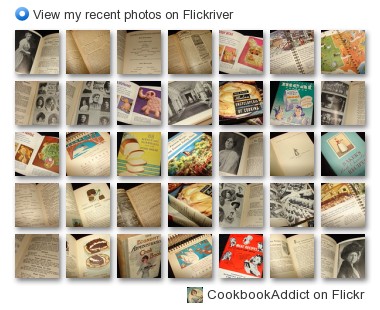 TIPS
TIPS* Just because a price guide said it was worth a certain price doesn't mean that's what it's going for. A book is worth only what someone is willing to pay for it, just remember that if you're thinking of selling later. Just because it's old doesn't mean it's valuable or rare. Usually authors that are setting prices are selling at the same time and in my opinion not a fair assesment of the market.
* The same word of caution goes for looking up a books worth online. There are scams going on a certain search shopping site where the seller lists the book WAY overpriced and then lists it again at a more normal price to make the lesser look like a steal. I feel terrible for the people that think their cookbook "was going for $80 on the internet!" when in actuality it's realistically worth $15. Find someone knowledgeable and transparent in prices and ask them questions. We all know if they are selling books as a profession they're expecting to walk away with some kind of profit for knowing their field and uncovering these hidden treasure and that’s acceptable but they shouldn't be trying to scam anyone. Check feedback scores!
 * Be careful of some online auction sites. Some people unload their crappiest and damaged stuff online making the description of the condition sound acceptable, hiding damage with “creative” camara angles and then ending up having a no return policy when you find out that the description was "sugar-coated". On the flip side you can get amazing steals this way also, it’s a gamble but sometimes it's the only way to get your hands on some of the bigger names. Sometimes you have to start at the bottom of the condition ladder and work your way up, if that's the only thing you can afford. Ask for pics though, the seller should be happy to oblige even if you ask for 20 more pics!
* Be careful of some online auction sites. Some people unload their crappiest and damaged stuff online making the description of the condition sound acceptable, hiding damage with “creative” camara angles and then ending up having a no return policy when you find out that the description was "sugar-coated". On the flip side you can get amazing steals this way also, it’s a gamble but sometimes it's the only way to get your hands on some of the bigger names. Sometimes you have to start at the bottom of the condition ladder and work your way up, if that's the only thing you can afford. Ask for pics though, the seller should be happy to oblige even if you ask for 20 more pics!
*Usually in the book collecting world writing and personalizing in the copy would decrease the value but that's not the case with cookbooks. The average cookbook collector values the personal touches and the little notes next to the recipes. * Be careful of some online auction sites. Some people unload their crappiest and damaged stuff online making the description of the condition sound acceptable, hiding damage with “creative” camara angles and then ending up having a no return policy when you find out that the description was "sugar-coated". On the flip side you can get amazing steals this way also, it’s a gamble but sometimes it's the only way to get your hands on some of the bigger names. Sometimes you have to start at the bottom of the condition ladder and work your way up, if that's the only thing you can afford. Ask for pics though, the seller should be happy to oblige even if you ask for 20 more pics!
* Be careful of some online auction sites. Some people unload their crappiest and damaged stuff online making the description of the condition sound acceptable, hiding damage with “creative” camara angles and then ending up having a no return policy when you find out that the description was "sugar-coated". On the flip side you can get amazing steals this way also, it’s a gamble but sometimes it's the only way to get your hands on some of the bigger names. Sometimes you have to start at the bottom of the condition ladder and work your way up, if that's the only thing you can afford. Ask for pics though, the seller should be happy to oblige even if you ask for 20 more pics! *Buy what you like and think "what if I never sell this book" will you be happy to keep it forever. If you are then in my opinion it's a win-win.
*Have fun but set a price limit!
*Research the authors and who they are. There are so many informative articles that go into the history of what makes a book so valuable. Maybe it's the illustrations and cover art or it's the 1st printing of a recipe classic.
 *Condition is a huge deal and ALWAYS buy the best you can afford.
*Condition is a huge deal and ALWAYS buy the best you can afford.Mistake printings can also contribute to a book's value just like baseball cards.
*You can get a feel for whether or not you're going to find anything in vendors stall just by reading a couple titles. Do not spend 2 hours in every stall or store reading every title! Although this is coming from somebody that has spent 6 hours doing the exact thing I suggested not to do:) Odds are that a guy selling antique car books and mags won't have a 1st edition Joy of Cooking but again these are ODDS, So sometimes you gotta play them:)


No comments:
Post a Comment